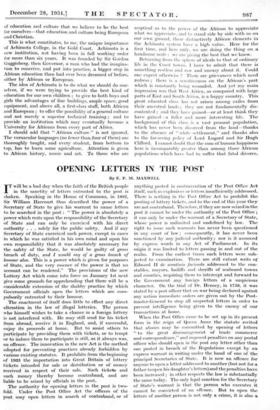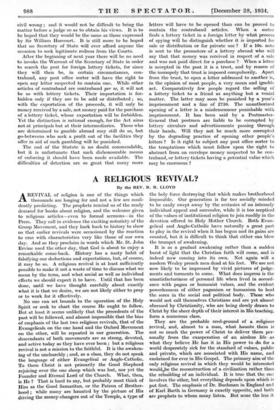OPENING LETTERS IN THE POST
By E. F. M. MAXWELL
IT will be a bad day when the faith of the British people in the sanctity of letters entrusted to the post is shaken. Speaking in the House of Commons, in 1882, Sir William Harcourt thus described the power of a Secretary of State to give his warrant to cause letters to be, searched in the post : " The power is absolutely a power which rests upon the responsibility of the Secretary of State and can only be exercised with his direct authority . . . solely for the public safety. And if any Secretary of State exercised such power, except in cases in which he was satisfied in his own mind and upon his own responsibility that it was absolutely necessary for the safety of the State, he would be guilty of gross breach of duty, and I would say of a gross breach of honour also. This is a power which is given for purposes of State, and the very essence of the power is that no account can be rendered." The provisions of the new Lottery Act which come into force on January 1st next give some grounds for apprehending that there will be a considerable extension of the shabby practice by which Government officials open the letters which are com- pulsorily entrusted to their honour.
The enactment of itself does little to effect any direct alteration in the law of illegal lotteries. The person who himself wishes to take a chance in a foreign lottery is .not interfered with. He may still send for his ticket from abroad, receive it in England, and, if successful, enjoy its proceeds at home. But to assist others to participate by providing them with tickets, or to tempt or to induce them to participate is still, as it always was, an offence. The innovation in the new Act is the method adopted for preventing practices already forbidden by various existing statutes. It prohibits from the beginning of 1935 the importation into Great Britain of lottery tickets- intended for sale or distribution or of money received in respect of their sale. Such tickets and such money thereby become contraband, and are liable to be seized by officials in the post.
The authority for opening letters in the post is two- fold. Under the Post Office Act the . officers of the past may open letters in - search of contraband, or of anything posted in contravention of the Post Office Act itself, such as explosives or letters insufficiently addressed. There is nothing in the Post Office Act to prohibit the posting of lottery tickets, and to the end of this year they are not contraband. Therefore, if they are now seized in the post it cannot be under the authority of the Post Office ; it can only be under the warrant of a Secretary of State, whose power is unlimited and undefined by law. The right to issue such warrants has never been questioned in any court of law ; consequently, it has never been sanctioned by any judicial authority ; nor is it assumed by express words in any Act of Parliament. In its origin it was limited to letters passing in and out of the realm. From the earliest times such letters were sub- jected to examination. There are still extant writs of Edward II de scrutinio faciendo addressed to the con- stables, mayors, bailiffs and sheriffs of seaboard towns and counties, requiring them to intercept and forward to the Government any foreign letters of a suspicious character. On the trial of Dr. Hensey, in 1758, it was stated by a post officer that on war being declared against any nation immediate orders are given out by the Post- master-General to stop all suspected letters in order to prevent intelligence being given to the enemy of our transactions at home.
When the Post Office came to be set up in its present form in the reign of Queen Anne the statute recited that abuses may be committed by opening of letters " to the great discouragement of trade commerce and correspondence," and imposed penalties on any postal officer who should open in the post any letter other than one posted in breach of the Regulations except by an express warrant in writing under the hand of one of the principal Secretaries of State. It is now an offence for anyone to open a letter addressed to another (but not for a father to open his daughter's letters) and the penalties have been increased ; in other respects the law is Substantially the same today. The only legal sanction for the Secretary of State's warrant is that the person who executes it cannot be convicted of an offence. But to open the letters of another person is not only a crime, it is also a civil wrong ; and it would not be difficult • to bring the matter before a judge so as to obtain his views. It is to be hoped that they would be the same as those expressed by Sir William Harcourt. It is still more to be hoped that no Secretary of State will ever afford anyone the occasion to seek legitimate redress from the Courts.
After the beginning of next year there will be no need to invoke the Warrant of the Secretary of State in order to search the post for foreign lottery tickets, for since they will then be, in certain circumstances, con- traband, any post office sorter will have the right to open any letter suspected to contain one. While other articles of contraband are contraband per se, it will not be so with lottery tickets. Their importation is for- bidden only if they are to be sold or distributed ; so, with the exportation of the proceeds, it will only be money received by a sale, not money paid for the purchase of a lottery ticket, whose exportation will be forbidden. Yet the distinction is rational enough, for the Act aims not at principals but at their intermediaries. Those who are determined to gamble abroad may still do so, but go-betweens who seek a profit out of the facilities they offer in aid of such gambling will be punished.
The end of the Statute is no doubt commendable, but it is unfortunate that such dishonourable means of enforcing it should have been made available. The difficulties of detection are so great that many more letters will have to be opened than can be proved to contain the contraband articles. When a sorter finds a lottery ticket in a foreign letter by whit process of spying will he distinguish whether it is imported for sale or distribution or for private use ? If a 10s. note is sent to the promoters of a lottery abroad who will say that that money was received in respect of a sale and was not paid direct for a purchase ? When a letter is accepted in the post it is a trust, and by reason of the monopoly that trust is imposed compulsorily. Apart from the trust, to open a letter addressed to another is, in the opinion of most people, a very mean and ignoble act. Comparatively few people regard the selling of a lottery ticket to a friend as anything but a venial matter. The latter may soon be punished by a year's imprisonment and a fine of £750. The unauthorized opening of a letter is a misdemeanour punishable with imprisonment. It has been said by a Postmaster- General that postmen are liable to be corrupted by lottery circulars and advertisements passing through their hands. Will they not be much more corrupted by the degrading practice of opening other people's letters ? Is it right to subject any post office sorter to the temptations which must follow upon the right to abstract from an envelope money suspected to be con- traband, or lottery tickets having a potential value which may be enormous ?



































 Previous page
Previous page